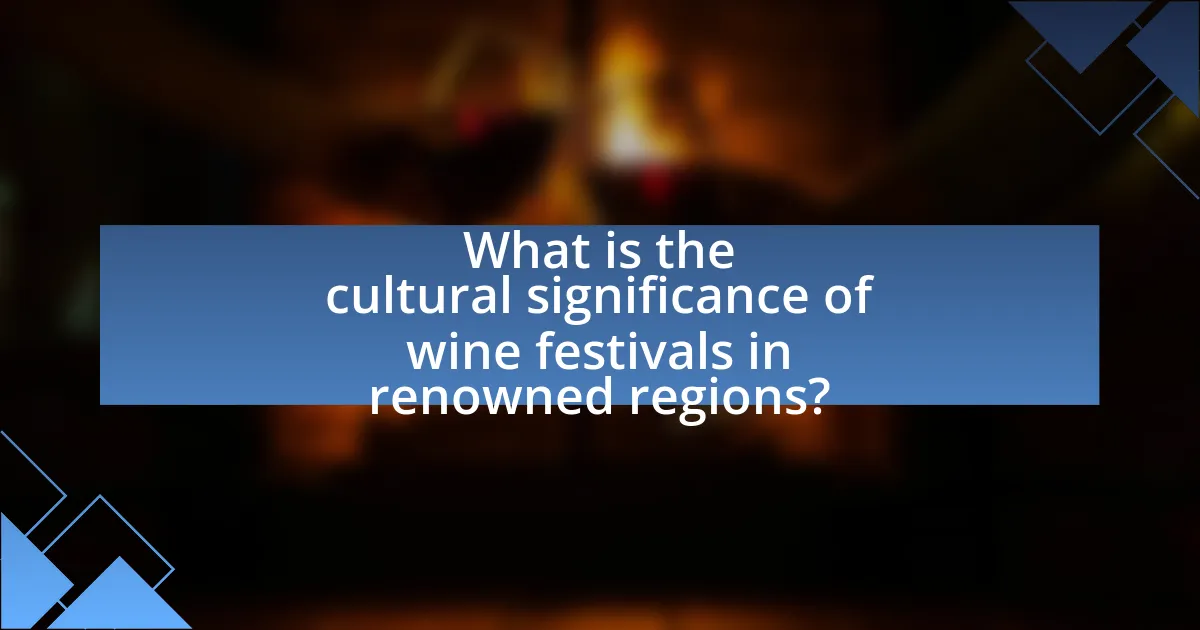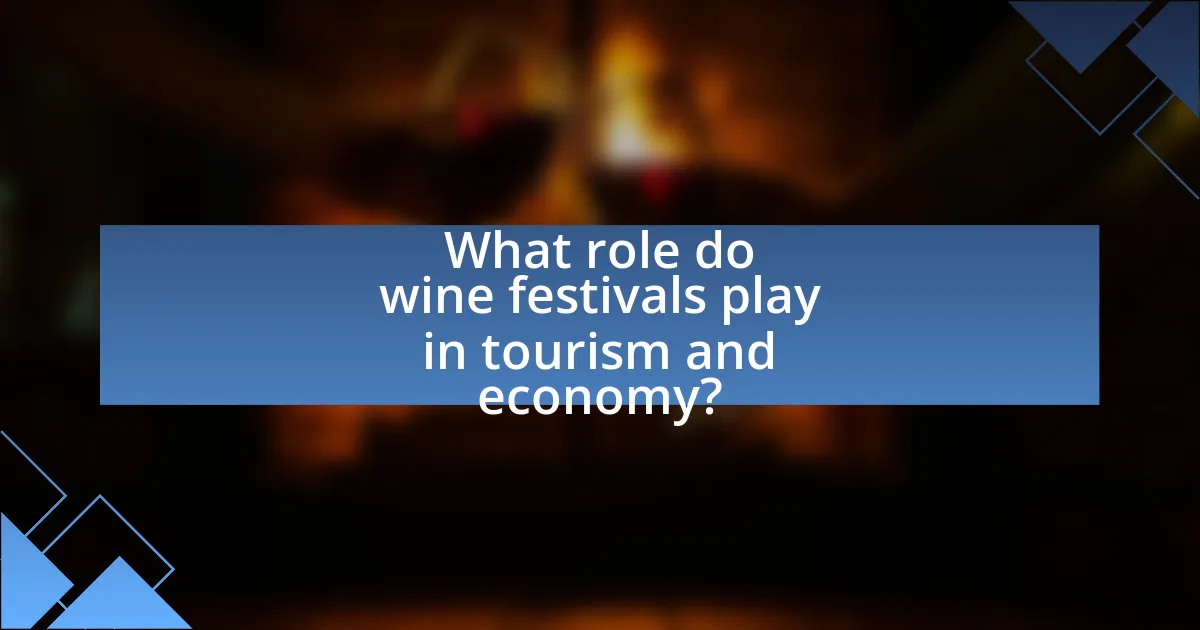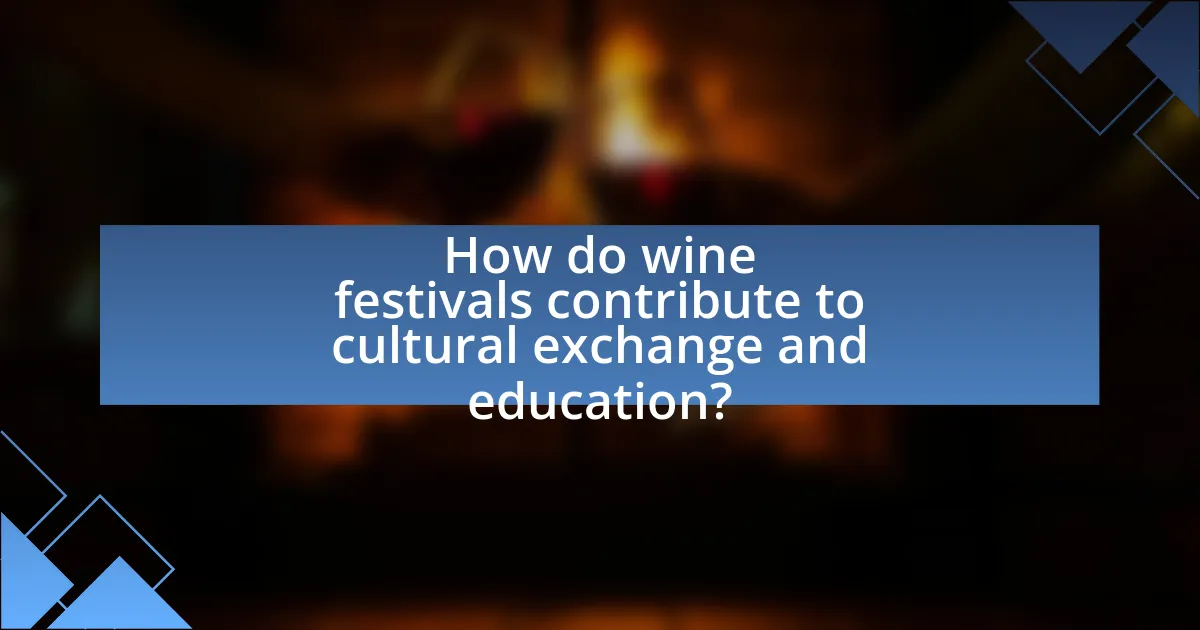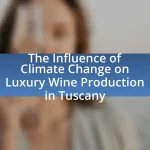Wine festivals in renowned regions are significant cultural events that celebrate local traditions, enhance community engagement, and promote regional identity. These festivals showcase unique wine production characteristics, reflecting the area’s history and heritage, while also attracting tourism and contributing to local economies. The article explores how wine festivals embody regional customs, the historical events that have shaped them, and their role in fostering community identity and pride. Additionally, it examines the economic benefits these festivals provide, including job creation and tourism stimulation, as well as their contribution to cultural exchange and education among participants.

What is the cultural significance of wine festivals in renowned regions?
Wine festivals in renowned regions hold significant cultural importance as they celebrate local traditions, promote community engagement, and enhance regional identity. These festivals often showcase the unique characteristics of the local wine production, reflecting the history and heritage of the area. For instance, the Napa Valley Wine Auction in California not only raises funds for local charities but also reinforces the region’s reputation as a premier wine destination. Additionally, events like the Fête de la Vigne in France highlight the agricultural practices and craftsmanship involved in winemaking, fostering a sense of pride among local vintners and residents. Such festivals also attract tourism, contributing to the local economy while preserving and promoting cultural practices associated with winemaking.
How do wine festivals reflect the traditions of their regions?
Wine festivals reflect the traditions of their regions by showcasing local grape varieties, winemaking techniques, and cultural practices associated with viticulture. For instance, the Napa Valley Wine Auction in California emphasizes the region’s commitment to sustainable farming and community support, highlighting local charities and environmental initiatives. Similarly, the Fête de la Vigne in France celebrates the historical significance of winemaking in regions like Burgundy, featuring traditional music, food pairings, and local artisans. These festivals serve as a platform for preserving and promoting regional identity, allowing attendees to experience the unique cultural heritage tied to wine production.
What historical events have shaped the wine festivals in these areas?
Historical events such as the establishment of viticulture in ancient civilizations, the influence of the Roman Empire, and the impact of the Phylloxera epidemic have significantly shaped wine festivals in renowned regions. The introduction of grape cultivation by the Greeks and Romans laid the foundation for wine culture, leading to the celebration of harvests and the establishment of festivals. The Roman Empire’s expansion facilitated the spread of winemaking techniques, which contributed to the regional diversity of wine festivals. Additionally, the Phylloxera epidemic in the late 19th century devastated vineyards, prompting communities to celebrate resilience and recovery through wine festivals, thus reinforcing their cultural significance.
How do local customs influence the celebration of wine festivals?
Local customs significantly shape the celebration of wine festivals by dictating the rituals, traditions, and community involvement that characterize these events. For instance, in regions like Bordeaux, France, local customs include traditional music, dance, and food pairings that enhance the wine tasting experience, reflecting the area’s cultural heritage. Additionally, specific customs such as grape stomping or blessing the harvest are integral to festivals like the Napa Valley Wine Auction in California, where local practices foster a sense of community and continuity. These customs not only enrich the festival atmosphere but also serve to educate attendees about the historical and cultural significance of the wines being celebrated, thereby reinforcing the local identity associated with wine production.
Why are wine festivals important for community identity?
Wine festivals are important for community identity because they celebrate local culture, heritage, and agricultural practices. These events foster a sense of belonging among residents by showcasing regional wines, which often reflect the unique characteristics of the area’s terroir. For instance, the Napa Valley Wine Auction in California not only highlights local vintners but also raises funds for community services, reinforcing social ties. Additionally, wine festivals attract tourism, which can enhance local economies and promote regional pride. This combination of cultural celebration and economic benefit solidifies the role of wine festivals as a cornerstone of community identity.
How do these festivals foster a sense of belonging among locals?
Wine festivals foster a sense of belonging among locals by creating communal experiences that celebrate shared cultural heritage. These events often involve traditional music, local cuisine, and regional wines, which reinforce community identity and pride. For instance, festivals like the Napa Valley Wine Auction not only showcase local vintners but also encourage residents to participate in activities that highlight their unique cultural narratives. This collective engagement strengthens social bonds and fosters a supportive environment, as evidenced by studies showing increased community cohesion during such events.
In what ways do wine festivals promote regional pride?
Wine festivals promote regional pride by showcasing local wines, celebrating unique cultural traditions, and fostering community engagement. These events highlight the distinct characteristics of regional wines, such as varietals and production methods, which enhances local identity. For example, festivals often feature local winemakers who share their stories and expertise, creating a sense of ownership and pride among residents. Additionally, wine festivals typically include traditional music, food, and art, which reflect the region’s heritage and strengthen community bonds. This combination of elements not only attracts visitors but also instills a sense of pride in locals, as they celebrate their cultural uniqueness and contributions to the wine industry.

What role do wine festivals play in tourism and economy?
Wine festivals significantly enhance tourism and contribute to the economy by attracting visitors, generating revenue, and promoting local businesses. These events draw thousands of tourists, as evidenced by the Napa Valley Wine Auction, which raised over $10 million for local charities in 2019, showcasing the economic impact of such festivals. Additionally, wine festivals stimulate local economies by increasing sales for wineries, restaurants, and hotels, creating jobs and fostering community engagement. The combination of cultural experiences and economic benefits makes wine festivals vital to both tourism and local economies.
How do wine festivals attract visitors to renowned regions?
Wine festivals attract visitors to renowned regions by showcasing local wines, culinary experiences, and cultural heritage. These events often feature tastings, workshops, and entertainment that highlight the unique characteristics of the region’s wine production. For instance, festivals in regions like Napa Valley or Bordeaux draw thousands of attendees annually, contributing significantly to local economies. According to the Napa Valley Vintners Association, wine tourism generates over $1 billion in economic impact for the region, demonstrating the effectiveness of festivals in attracting visitors.
What marketing strategies are used to promote these festivals?
Wine festivals utilize a variety of marketing strategies to enhance visibility and attract attendees. These strategies include social media campaigns, partnerships with local businesses, and targeted advertising in regional publications. For instance, social media platforms like Instagram and Facebook are leveraged to share engaging content, such as photos and videos from past festivals, which helps to create buzz and anticipation. Collaborations with wineries, restaurants, and hotels also serve to cross-promote events, thereby reaching a wider audience. Additionally, targeted ads in local newspapers and magazines ensure that the festival information reaches potential attendees who are interested in wine and cultural events. These combined efforts effectively increase attendance and enhance the overall experience of wine festivals.
How do wine festivals impact local businesses and economies?
Wine festivals significantly boost local businesses and economies by increasing tourism, generating sales, and creating job opportunities. These events attract thousands of visitors, leading to higher spending in hotels, restaurants, and retail shops. For instance, a study by the University of California found that wine festivals can generate up to $1 million in local economic impact over a weekend, primarily through visitor expenditures. Additionally, local wineries benefit from direct sales and increased brand exposure, while ancillary services such as transportation and entertainment also see a rise in demand. This multifaceted economic stimulation illustrates the vital role wine festivals play in enhancing the financial health of local communities.
What economic benefits do wine festivals provide to local communities?
Wine festivals provide significant economic benefits to local communities by boosting tourism, increasing local business revenue, and creating job opportunities. These events attract thousands of visitors, which stimulates spending in hotels, restaurants, and shops. For instance, a study by the University of California found that wine festivals can generate over $1 million in local economic impact, with attendees spending an average of $100 per day. Additionally, local wineries and vendors benefit from increased sales and exposure, further enhancing the community’s economic landscape.
How do wine festivals create job opportunities in the region?
Wine festivals create job opportunities in the region by attracting tourists and generating demand for various services. These events require staffing for roles such as event management, security, food and beverage service, and entertainment, leading to temporary and permanent employment. For instance, a study by the National Association of Wine Retailers found that wine festivals can increase local employment by up to 20% during the event period, as local businesses hire additional staff to accommodate the influx of visitors. This economic boost not only supports existing jobs but also encourages the growth of new businesses in hospitality, retail, and tourism sectors.
What are the long-term economic effects of hosting wine festivals?
Hosting wine festivals leads to long-term economic benefits, including increased tourism, enhanced local business revenues, and job creation. These festivals attract visitors who spend on accommodations, dining, and local attractions, significantly boosting the economy of the host region. For instance, a study by the University of California found that wine festivals can generate up to $1.5 million in economic impact for local communities through direct and indirect spending. Additionally, the increased visibility and reputation of the region as a wine destination can lead to sustained tourism growth, further solidifying the economic advantages over time.

How do wine festivals contribute to cultural exchange and education?
Wine festivals contribute to cultural exchange and education by showcasing diverse wine traditions and practices from various regions. These events facilitate interactions between local winemakers and international visitors, allowing for the sharing of knowledge about viticulture, winemaking techniques, and regional histories. For instance, festivals often include workshops, tastings, and seminars led by experts, which educate attendees about the cultural significance of wine in different societies. Additionally, according to a study by the University of California, wine festivals enhance cultural appreciation by promoting local cuisines and arts, thereby fostering a deeper understanding of the cultural contexts surrounding wine production.
What educational opportunities do wine festivals offer to attendees?
Wine festivals offer attendees various educational opportunities, including workshops, tastings, and seminars led by industry experts. These events often feature sessions on wine production techniques, grape varieties, and food pairings, allowing participants to deepen their understanding of viticulture and enology. For instance, many festivals provide guided tastings where attendees can learn about the sensory evaluation of wines, enhancing their appreciation and knowledge of different styles and regions. Additionally, some festivals include discussions on the cultural and historical significance of wine in specific regions, further enriching the educational experience.
How do workshops and tastings enhance the cultural experience?
Workshops and tastings enhance the cultural experience by providing immersive, hands-on engagement with local traditions and practices. These activities allow participants to learn directly from artisans and experts, fostering a deeper understanding of the cultural significance behind the products, such as wine. For instance, during wine tastings, individuals not only sample various wines but also gain insights into the history, geography, and techniques involved in winemaking, which are integral to the region’s identity. This experiential learning promotes appreciation and respect for the cultural heritage, as evidenced by studies showing that interactive experiences significantly increase cultural awareness and connection among participants.
What role do local winemakers play in educating festival-goers?
Local winemakers play a crucial role in educating festival-goers about wine production, tasting techniques, and regional varietals. They provide firsthand knowledge of the winemaking process, sharing insights into grape cultivation, fermentation, and aging, which enhances attendees’ appreciation for the craft. Additionally, local winemakers often conduct tastings and workshops, allowing festival-goers to experience the flavors and characteristics of their wines directly. This interactive engagement fosters a deeper understanding of the cultural and historical significance of the wines produced in the region, reinforcing the connection between the local community and its wine heritage.
How do wine festivals facilitate cultural exchange among participants?
Wine festivals facilitate cultural exchange among participants by providing a platform for diverse communities to share their unique wine traditions, culinary practices, and cultural narratives. These events often feature local wines, traditional food pairings, and cultural performances, allowing attendees to experience and appreciate different cultural heritages. For instance, festivals like the Napa Valley Wine Auction in California attract international visitors, promoting interactions that enhance understanding and appreciation of various winemaking techniques and regional customs. This exchange fosters a sense of community and global interconnectedness, as participants engage in discussions, tastings, and cultural activities that highlight the significance of wine in different societies.
In what ways do international visitors influence local wine culture?
International visitors influence local wine culture by introducing diverse preferences and consumption patterns, which can lead to the evolution of local wine offerings. Their presence often encourages wineries to adapt their products to cater to global tastes, resulting in innovative blends and styles that reflect international trends. For instance, regions like Napa Valley have seen an increase in varietals that appeal to international markets, such as Sauvignon Blanc and Pinot Noir, driven by visitor demand. Additionally, international visitors contribute to the local economy through tourism, which can fund wine festivals and events that celebrate both local and global wine cultures, further enriching the community’s wine heritage.
How do wine festivals promote understanding of global wine traditions?
Wine festivals promote understanding of global wine traditions by showcasing diverse wine varieties, production methods, and cultural practices from different regions. These events facilitate direct interaction between winemakers and attendees, allowing for the exchange of knowledge about local grape varieties, fermentation techniques, and historical contexts. For instance, festivals often feature educational seminars and tastings that highlight the unique characteristics of wines from various countries, such as the terroir of French Bordeaux or the innovative techniques of California wineries. This immersive experience fosters appreciation and awareness of the cultural significance of wine, enhancing participants’ understanding of its role in social and culinary traditions worldwide.
What are some best practices for organizing a successful wine festival?
To organize a successful wine festival, it is essential to focus on thorough planning, effective marketing, and engaging programming. Thorough planning involves selecting an appropriate venue that accommodates both attendees and vendors, ensuring accessibility and comfort. Effective marketing strategies, such as leveraging social media and local partnerships, can significantly increase attendance; for instance, festivals that utilize targeted online advertising often see a 30% increase in ticket sales. Engaging programming, including wine tastings, educational workshops, and live entertainment, enhances the overall experience and encourages repeat attendance. Festivals that incorporate these elements typically report higher satisfaction rates among participants, reinforcing the importance of these best practices.
How can organizers ensure a diverse and engaging program?
Organizers can ensure a diverse and engaging program by incorporating a variety of cultural perspectives, activities, and speakers that reflect the community’s demographics and interests. This approach not only attracts a wider audience but also enriches the festival experience. For instance, including local winemakers, chefs, and artists from different backgrounds can showcase the region’s cultural diversity and enhance the festival’s appeal. Research indicates that events featuring diverse programming see increased attendance and participant satisfaction, as they cater to a broader range of tastes and preferences.
What strategies can be implemented to enhance visitor experience?
To enhance visitor experience at wine festivals, organizers can implement strategies such as interactive tastings, educational workshops, and immersive cultural activities. Interactive tastings allow visitors to engage directly with winemakers, fostering a personal connection to the wines. Educational workshops can provide insights into wine production, enhancing appreciation and knowledge. Immersive cultural activities, such as traditional music and dance performances, create a festive atmosphere that enriches the overall experience. These strategies have been shown to increase visitor satisfaction and engagement, as evidenced by surveys indicating that attendees value hands-on experiences and cultural immersion at such events.


